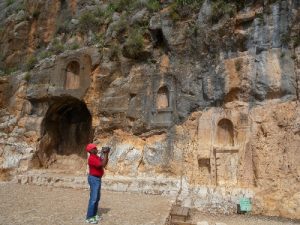HOMILY WEEK 06 04 – Year I
Transformative Faith
(Gen 9:1-13; Ps 102; Mk 8:27-33)
***********************************
When in the Holy Land in 2013 for a sabbatical, our group of priests found our way to northeastern Galilee, to Caesarea Philippi.
There, we experienced the thrill of standing where Jesus once stood, and reflected on his message to his disciples at that time – which is the same question asked in the Gospel for today: “Who do people say that I am?”
That question has resonated throughout the ages ever since then. It seems every year some magazine such as Macleans will feature an article, and often a front cover, asking that same question – who really is this Jesus of Nazareth?
 The location of Caesarea Philippi is significant, because it was an outdoor shrine to all kinds of gods and goddesses of many different faiths. We could see the remains of alcoves where statues had been placed, and the remains of dancing goats also considered as gods. The cave there was considered the home of the god Pan, and serves as the headwaters of the Jordon River.
The location of Caesarea Philippi is significant, because it was an outdoor shrine to all kinds of gods and goddesses of many different faiths. We could see the remains of alcoves where statues had been placed, and the remains of dancing goats also considered as gods. The cave there was considered the home of the god Pan, and serves as the headwaters of the Jordon River.
This site was also on the trade route from East to West, the doorway to the Silk Highway to the East, so it served as a crossroads for the social, economic, political and cultural life of many nations at that time.
Scholars suggest this very location, a kind of centre of the Middle East, was deliberately chosen by Jesus as the place where he would ask his disciples, “So, who do all these people, given over to so many other gods, say that I am?” Their reply varied, guessing “John the Baptist, Elijah, one of the prophets.”
More importantly, Jesus was interested in who they thought he was. Peter, surely inspired by the Holy Spirit, gave the right answer: “You are the Messiah.”
That simple answer is a revolutionary answer. Peter would be implying Jesus was the long-awaited figure whom the Israelites were praying and hoping would come to liberate them from all their enemies and oppressors – especially the cruel and harsh Romans.
But Jesus quickly quelled that expectation as a false one with his immediate prediction of his Passion. The Messiah would not be a political or economic saviour who would destroy political enemies or oppressive economic systems. He would be a very ordinary Son of Man who would simply live out God’s unconditional love and mercy, to the point of suffering and dying for us in such a special way (without resentment or bitterness, with only unconditional love and forgiveness) that the hearts of those who believe in him would be transformed to strive to be just like him.
His resurrection from the dead was the final, vindicating proof, and the gift of the Holy Spirit at Pentecost the final impetus, to jell these humble followers of Jesus into the Church tasked to build up the Reign of God Jesus came to inaugurate here on earth, through humble mercy, compassion, forgiveness, unconditional love and especially non-violence.
No wonder Peter reacted so swiftly to rebuke Jesus – that was not what they expected or wanted at all! And immediately, Jesus had to point out to them this new way was far beyond any human comprehension – they would have to have faith to follow him, but in the end, it is only that power of powerlessness, that unconditional love and forgiveness, that will break the cycle of violence in our world and establish the reign of God.
Robert, at a men’s meeting, was sharing how he could not stay with his abusive, alcoholic controlling father in business and survive. He escaped into the military, which for a while played the role of another father, with a brotherhood and training, until he realized he could not be at home there either, as the bottom line was being trained to kill, and he did not want to kill anyone.
His faith in Jesus led him to another career as a consultant, and to become the best father and grandfather he could be to his own children, even though that was new territory for him, as he had never really been fathered or grandfathered himself. What is keeping him going is his faith in Jesus, the support of his men’s group, and the knowledge that he is breaking the cycle of dysfunction in his family, just as Jesus broke the cycle of violence and dysfunction in our world.
The Eucharist is our mainstay in this process of changing the world, one person and one day at a time. We experience the unconditional love and compassion of Jesus that strengthens us to go out and to live our own Paschal Mystery, as we work with him in building up the Reign of God and changing the world, one day at a time. As Richard Rohr would say, “Transformed persons transform persons.”



